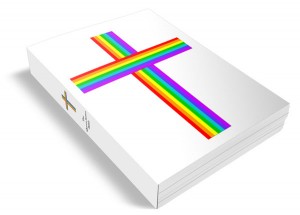Get Ready for the Big Gay Bible
What the Bible has to say about homosexuality has long been up for debate. And while the scripture – however much it was passed down through much doctoring over the centuries – it takes a pretty steadfast view (in the Old Testament anyway) against all things gay. But by the time Jesus makes an appearance – with a much more tolerant view of people – things start looking up.
But things have never looked quite so rosy for religious queers as they do now that a new version of the Bible has been produced. This one – known as the Queen James Bible – is a gay-friendly alternative to the “Good Book.” It’s basically been scrubbed of references that are believed to be homophobic.
But before anyone gets too upset over the editing, we should consider that the Bible itself is by no means a pristine document. It has gone through many, many revisions – leaving much up to interpretation and applied through a cultural context that may not exactly make a whole lot of sense as we approach 2013. The book of Leviticus (where the famous passage about man being forbidden to lie with man) has its share of winners.
For instance, should anyone who curses his mother or father really be killed (Leviticus 20: 9)? If a man has sex with a woman during her period – should they both be shunned (Leviticus 20:18)? Are people with disabilities really banned from the church (Leviticus 21: 17-18)?
The extreme isn’t only found in Leviticus, however. There are also these beauties: Should people who preach against God be put to death (Deuteronomy 13: 5)? Should only men with both testicles be allowed into church (Deuteronomy 23: 1)?
The list goes on. That’s why the editors of this big gay Bible said they decided to reinterpret verses in order to create a more culturally sympathetic book.
“Homosexuality was first mentioned in the Bible in 1946 in the Revised Standard Version,” according to the editors. “There is no mention of or reference to homosexuality in any Bible prior to this – only interpretations have been made. Anti-LGBT Bible interpretations commonly cite only eight verses in the Bible that they interpret to mean homosexuality is a sin; Eight verses in a book of thousands!”
They do have a point. But if we polish up verses that can be construed as anti-gay, what about others that are anti-woman or even culturally insensitive? Does it make more sense to simply read between the lines and appreciate some of the more lofty, symbolic goals – like being decent to each other in the first place?
Tell us what you think: Should Biblical passages about homosexuality be reexamined or left as is?



